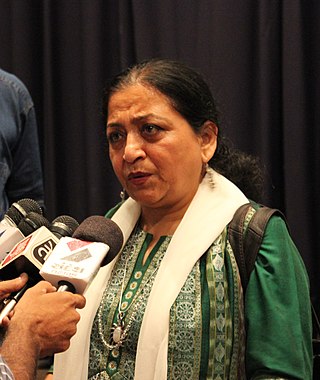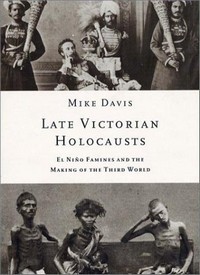Hindutva ("Hindu-ness") is the predominant form of Hindu nationalism in India. The term was formulated as a political ideology by Vinayak Damodar Savarkar in 1923. It is used by the Rashtriya Swayamsevak Sangh (RSS), the Vishva Hindu Parishad (VHP), the Bharatiya Janata Party (BJP) and other organisations, collectively called the Sangh Parivar.

David Frawley is an American author, astrologer, teacher (acharya) and a proponent of Hindutva.
A colonial mentality is the internalized attitude of ethnic or cultural inferiority felt by people as a result of colonization, i.e. them being colonized by another group. It corresponds with the belief that the cultural values of the colonizer are inherently superior to one's own. The term has been used by postcolonial scholars to discuss the transgenerational effects of colonialism present in former colonies following decolonization. It is commonly used as an operational concept for framing ideological domination in historical colonial experiences. In psychology colonial mentality has been used to explain instances of collective depression, anxiety, and other widespread mental health issues in populations that have experienced colonization.
Political polarization is the divergence of political attitudes away from the center, towards ideological extremes.
Communalism is a term used to denote attempts to construct religious or ethnic identity, incite strife between people identified as different communities, and to stimulate communal violence between those groups. It derives from history, differences in beliefs, and tensions between the communities. Communalism is a significant social issue in India, Bangladesh, Pakistan and Sri Lanka. Communal conflicts between religious communities in India, especially Hindus and Muslims have occurred since the period of British colonial rule, occasionally leading to serious inter-communal violence.

The Santhal rebellion, was a rebellion in present-day Jharkhand and West Bengal, Eastern India against both the British East India Company (BEIC) and zamindari system by the Santhal. It started on June 30, 1855 and on November 10, 1855, martial law was proclaimed by the East India Company which lasted until January 3, 1856 when martial law was suspended and the rebellion was eventually suppressed by the Presidency armies. The rebellion was led by the four sibling Brothers - Sidhu, Kanhu, Chand and Bhairav.

Madhu Purnima Kishwar is an Indian academic and a commentator. She is currently employed as a chair Professor in the Indian Council of Social Science Research. Kishwar along with fellow-academic Ruth Vanita co-founded the journal Manushi.

Late Victorian Holocausts: El Niño Famines and the Making of the Third World is a book by Mike Davis about the connection between political economy and global climate patterns, particularly the impact of colonialism and the introduction of capitalism during the El Niño–Southern Oscillation related famines of 1876–1878, 1896–1897, and 1899–1902 across multiple continents. The book's main conclusion is that the deaths of 30–60 million people killed in famines all over the world during the later part of the 19th century were caused by the laissez-faire and Malthusian economic ideology of the colonial governments.
S. N. Balagangadhara is a professor emeritus of the Ghent University in Belgium, and was director of the India Platform and the Research Centre Vergelijkende Cutuurwetenschap.

Targeted Killing in International Law is a book about the legality of targeted killing, written by Nils Melzer. It was first published by Oxford University Press in May 2008. The book explores the history of targeted killing as a government strategy by multiple countries including the United States, the United Kingdom, Israel, Switzerland and Germany; for both military and law enforcement purposes. Melzer argues that directly after the September 11 attacks in the United States, perceptions of the tactic became more positive.
Shirin M. Rai, is an interdisciplinary scholar who works across the political science and international relations boundaries. She is known for her research on the intersections between international political economy, globalisation, post-colonial governance, institutions and processes of democratisation and gender regimes. She was a professor of politics and international studies at the University of Warwick, and is the founding director of Warwick Interdisciplinary Research Centre for International Development (WICID).
McDonaldisation, Masala McGospel and Om Economics is a book on the phenomenon of televangelism in contemporary, urban India undertaken by Jonathan D. James of Edith Cowan University in Australia.
Tarak Chandra Das (1898–1964) was an anthropologist of Calcutta University. He did his Masters' from Calcutta University in ‘Ancient Indian History and Culture’ and joined the then newly founded Department of Anthropology at Calcutta University in 1921 as a research scholar and then he became lecturer in 1923 and finally retired as a Reader from the Department in 1963. Das conducted extensive fieldworks in Chotanagpur in the then Bihar and in Assam.
Meenakshi Jain is an Indian political scientist and historian who served as an associate professor of history at Gargi College, Delhi. In 2014, she was nominated as a member of the Indian Council of Historical Research by the Government of India. In 2020, she was conferred with the Padma Shri, India's fourth highest civilian award, for her work in the field of literature and education.
Gloria Goodwin Raheja is American anthropologist who specializes in ethnographic history. She is the author of several historical works where she explores the concepts of caste and gender in India, colonialism, politics of representation, blues music, capitalism in the Appalachia and other diverse topics. Raheja argues that caste stratification in India was influenced by British colonialism. Monographs on ethnographic history and India have been considered "acclaimed" by the Journal of the Royal Anthropological Institute.

Padma Anagol is a historian known for her work on women's agency and subjectivities in colonial India. Her work broadly focuses on gender and women's history in colonial British India. Her research interests also include a wide spectrum of topics such as material culture, consumption and Indian middle classes, theory, historiography and periodization of Modern India and comparative histories of Victorian and Indian patriarchies over the issues of social legislation.
David Anthony Washbrook was a British historian and author who studied modern India with a specific focus on the socio-political and economic conditions of South India between the 18th and 20th centuries. He was the director of the Centre for Indian Studies and a member of the Faculty of Oriental Studies at the University of Oxford and later a research professor and fellow of South Asian history at Trinity College, Cambridge.

Gautam Bhatia is a constitutional law scholar and science fiction author from India.
Seema Alavi is an Indian historian. She is a professor of history at Ashoka University, India and specializes in medieval and early modern South Asia.
Chetan Singh is an academic historian from Himachal Pradesh, India. He is noted for his work on the history of early modern and modern western Himalayas.






